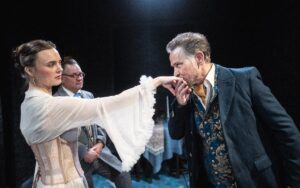
Nick Gehlfuss and Caroline Neff in “Fool for Love” at Steppenwolf Theatre
Somewhat Recommended
Full of potential, the set design by Todd Rosenthal is the highlight of this drama by playwright Sam Sheppard at Steppenwolf.
A sparsely furnished motel room dominates the stage. Along the perimeter an empty swimming pool, an imposing neon MOTEL sign, a massive telephone pole and bits of scrub grass suggest this is essentially the bottom of the barrel in the middle of nowhere somewhere at the end of the line.
The massive sky in the background adds to the idea that this is a story of two people stuck in a small room focused on their problems while there is a whole big world outside that really doesn’t care.
As the lights come up, Eddie (Nick Gehlfuss) is fussing with a bit of some kind of saddle gear as May (Caroline Neff) sits despondently at the edge of the bed.
Decked out in a western shirt, jeans, cowboy hat and boots and the ensuing dialogue all suggest that he is a semi-accomplished rodeo stuntman. She is a lost-soul living in squalor trying to disappear.
Eddie quickly reveals he has travelled more than two thousand miles because he cannot live without her. May lets him know she does not care and is not going to be sucked in once more to this on-again, off-again relationship that includes his wild dreams of a home in the country which she does not desire.
Outside, an old man (Tim Hopper) sits in a chair silently listening to their story unfold. Who are they? What is their previous relationship? Why is it so intense and volatile? Who is the old man?
These are the intriguing devices setup to draw us in, but I simply did not care about these ill-behaved, self-indulgent, self-obsessed characters.
I quickly felt they deserved whatever mess they were in, derived largely by their inability to communicate effectively with each other and to resolve their prior history. Move on.
Is this the best either of them can do? Apparently not because in a poorly developed subplot, Eddie is being pursued by an unseen “Countess” in a Mercedes limo who, in a fit of jealousy, has tailed him across half the country to destroy his pick-up truck and burn his horse trailer outside this remote dump. Really?
May is developing a perfectly normal dating relationship with Martin (Cliff Chamberlain), a respectable local man who wanders into this chaos for no good reason other than to bear witness to their madness and provide Eddie an opportunity to spill his guts about the secret behind the long-term affair.
In the end, Martin is left alone in the motel room presumably as bewildered as I am.
Since the truth involves the identity of the old man outside and is something of a spoiler, I will not reveal it here. After all it is the turning point of all the fuss and bother and I suppose might be or have been shocking at some point.
Making it more confusing is that the dialogue is vague about at what point May and Eddie understood the secret truth.
The purpose of the old man’s presence is unclear but he speaks to us of reality and fantasy. It is my opinion that the entire scene is an attempt for him to resolve the events that he put in motion through his own actions and misdeeds. He is the reality, the rest is his fantasy. The ambiguity might be related to the fact that old man does not really know if this relationship is resolved or not.
There is a sort of mythic tragic quality to the whole thing but not nearly as interesting.
The performances by this capable cast were fine. At best this is a mildly interesting character study involving two basically shallow people trapped in a relationship from which they feel unable to escape. It involves emotional highs and lows which might be useful in an acting class but which are not all that compelling as a full-blown production.
Forty years ago when it was first produced, this story might have been a bit more edgy, but I’m not sure it feels fresh today. Perhaps we are exposed to too much. I do not feel a sincere bond between Eddie and May or an intense compulsion to be together. There is no real heat. It is implied but does not have the fire.
Steppenwolf is the very pinnacle of dramatic theater in Chicago and I was excited at the prospect of seeing something thought provoking and memorable. Of all of the plays in the world including those of Sam Sheppard, why this? At seventy-five minutes it did not even satisfy as a night out.
If you are interested in the history and craft of playwriting, you might find some value, but I cannot in good conscience suggest that this is where my readers or podcast listeners should invest what might be limited theater dollars. Wait for a better production here, which will undoubtably come along soon.
Details: “Fool for Love” is at Steppenwolf Theater, 1650 North Halsted Street, Chicago through March 23, 2025. Tickets and other information available at steppenwolf.org or by calling (312)335-1650.













